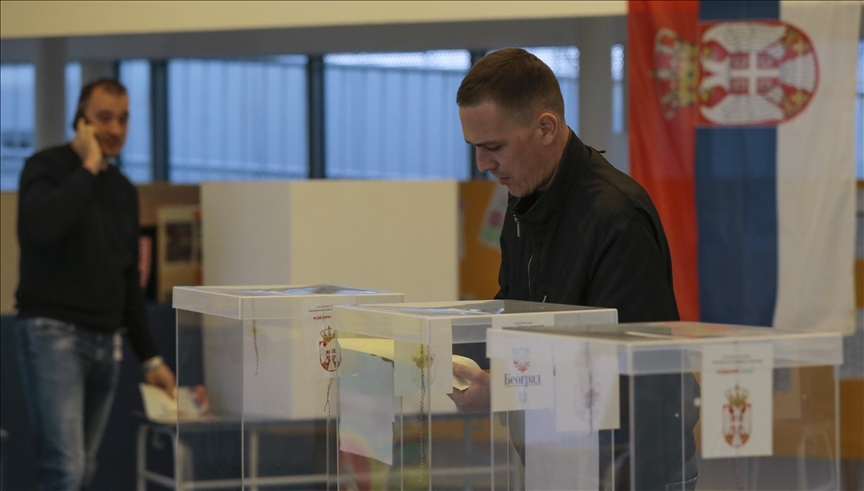Serbian voters head to polls to shape nation’s future
6.5 million eligible voters to select 250-seat parliament, 120-member Assembly of Autonomous Province, municipal councils

BELGRADE, Serbia Serbians are heading to the polls on Sunday to choose new members of the country's 250-seat parliament, 120-member Assembly of the Autonomous Province of Vojvodina and municipal councils.
Polling stations opened at 7 a.m. local time and will close at 8 p.m. for around 6.5 million eligible voters.
Voting will be cast in 8,273 election centers in Serbia and 81 election centers in 35 countries.
A total of 2,817 candidates are competing on 18 lists and 126 seats are needed for a majority in the Assembly.
The newly-elected president and the new government will need to deal with major issues that Serbia is facing.
One is in the breakaway region of Kosovo, which declared independence in February 2008. But Belgrade claims it is a breakaway province.
Serbia has also refused to impose sanctions on Russia for the Ukraine war.
The government is facing pressure from the European Union and the US to recognize Kosovo's independence and impose sanctions on Russia.
Serbs living in Kosovo will not be able to vote in the Serbian general elections, according to the Election Committee.
Kosovo Prime Minister Albin Kurti said earlier that they need a special agreement with Serbia so that members of the Serbian community in Kosovo who have dual citizenship can vote in Serbian parliamentary elections on the territory of Kosovo.
But Anadolu reported earlier that Serbs in Kosovo will not be able to vote, according to Serbian President Aleksandar Vucic.
Vucic's remarks came when Anadolu asked if NATO would take additional security measures for Serbs in Kosovo for the Dec.17 snap general elections.
He claimed that Serbs are going to be barred from their basic right due to Kurti's involvement in the electoral process.
Serbs living in Kosovo were not allowed by Kosovar authorities to participate in the last Serbian elections in 2020 when the alliance led by the Serbian Progressive Party (SNS) that was headed by Vucic came to power.
Following these developments, Kosovo Serbs will be taken to Serbia by bus to vote, as in the 2022 elections.
Major runners
At the top of the list is "Aleksandar Vucic - Serbia must not stop," formed by the Serbian Progressive Party (SNS), which has been in power since 2012 and its coalition partners.
Vucic announced in April that he stepped down as leader of the Serbian Progressive Party (SNS) but party representatives believe he is still their face and leader.
He also addressed the public by attending SNS rallies during the 45-day election campaign.
"I think we will gain the absolute majority in the parliament on our own. This is the goal. We will not be happy with the opposite situation. I wish the victory of the SNS in all the cities that the opposition claims to win." said Vucic.
Second is the Socialist Party of Serbia (SPS), which was once chaired by former President Slobodan Milosevic, who died while his trial was being conducted at the International Criminal Tribunal for the former Yugoslavia (ICC) for crimes he committed during the 1992 - 1995 war in Bosnia Herzegovina.
Foreign Minister Ivica Dacic, who is on the list, is competing under the slogan: "Prime Minister of New Serbia."
Third on the list is the name of war criminal Vojislav Seselj, chairman of the Serbian Radical Party.
Seselj was tried at the ICC for crimes committed against the non-Serb population in Bosnia Herzegovina, Serbia and Croatia during the 1990s war. He was sentenced to 10 years in prison in an appeal, but was not imprisoned because he was in prison between 2003 and 2014, while he was being tried.
The opposition wing, known as pro-European, and opposition parties that came together after armed attacks in May, are also competing on separate lists.
Another notable name on the list is Vojislav Mihailovic, the grandson of Dragoljub Mihailovic, the founder of the Serbian nationalist Chetnik movement.
A total of 5,587 observers, including seven deputies from Türkiye, will monitor the elections, according to the President of the State Election Commission (RIK) Vladimir Dimitrijevic.
Official results will be announced within 96 hours after the commission receives the last summary result.
Parliament should be established within 30 days after the results are announced and the new government should be announced within 90 days after the establishment of parliament.








